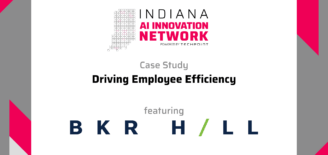Attention Indiana legislators: go big before you go home
For a legislative session that opened with such promise for the tech community, a couple of initiatives look to be staring death in the face.
The first, a training tax credit for companies investing in the development of their employees, can no longer be found in any active bills. But not all is lost. Legislators still have time to pour more funding into the Skills Enhancement Fund (SEF). Instead of a tax credit, SEF is an actual cash grant that reimburses businesses one-half of their training expenses.
Indiana has a huge workforce gap in the tech community. My firm alone has had more tech clients than we can count looking to fill positions but not enough viable candidates to fill them. SEF has made a tremendous difference in helping them solve this challenge. But with SEF cash in perpetual short supply, its impact is limited.
As the current House budget stands, SEF funding is unfortunately flat through the next budget cycle. If this budget holds course, it truly will be a missed opportunity.
Then comes the matter of making the VCI tax credit transferrable. The good news here is that this language still exists in active legislation. But again, its fate is uncertain as some wary legislators have bristled at the idea of making credits salable.
And there has been almost no traction in making VCI a refundable credit – i.e., convertible into cash. This step would be an even bigger game-changer than making VCI transferrable.
For all of the strides Indiana has made in the tech sector, there is still much work to do. The Indiana tech community is not yet one of the cool kids when it comes to out-of-state investors or would-be employees, and it can still be an incredibly difficult environment to raise capital. Many investors see the Hoosier state as flyover country and ask the question, “Why Indiana?” What’s more, the workforce pipeline here has not reached a critical mass.
Meanwhile, every metropolitan area in the country is competing madly for the same tech companies and same jobs. Many of these communities have better tech infrastructure and other quality-of-life assets – those showy oceans and mountains – that put them at an advantage over Indiana. So Indiana is in no position to rest on its laurels.
Despite the great strides this state has made (the Salesforce announcement continues to be a big, big deal), it has to maintain the Little-Engine-that-Could attitude that has put it on the map. Such an effort includes engagement from all critical parties.
That includes you, legislators. The Indiana General Assembly can’t pass laws creating mountains or oceans, but it still has time this session to make Indiana a better, more competitive place for tech to do business.






































